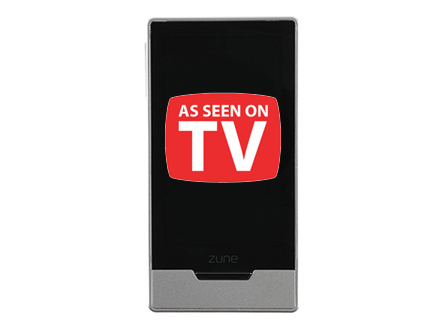Why pre-roll app ads on the Zune HD are a dealbreaker

Apps for new Microsoft Zune HD portable media player have become available, and they're leaving a bad taste in users' mouths.
The apps, which are free and developed in-house by Microsoft, are subsidized with static ads and video ads that play during launch, reports Ars Technica.
Nine apps are available from the Zune HD marketplace so far: Calculator, Weather, Texas hold 'em, Sudoku, Space Battle 3, Shell Game... Of the Future, Hexic, Goo Splat and Chess.
But the company's decision to sell ads against the apps -- some of which are pretty basic -- seems to have thrown a wrench in the user experience.
A wrench the size of four hamsters in a Kia Soul, for example:
Ars' Nate Anderson writes:
Booting Chess took 30 seconds, though I suppose one could be grateful for the Kia Soul video that gives the eyes something to do. Launching the weather app takes about 8 seconds, the calculator about 9. Goo Splat, which has been showing a static ad this morning for the Soul, launches in about 17 seconds.
Before you get out your pitchforks, Anderson says ads don't show up for the calculator and weather apps.
But the decision to implement such a large ad presence on the device is a bold, and potentially detrimental, one.
For sure, mobile apps contain advertisements, but the space is a very unproven one for most advertisers, and many have attempted different tactics to monetize their content:
- Some apps, of course, cost an upfront fee.
- Some apps require a subscription, usually from an existing external site.
- Some free apps display persistent small banner ads.
- Some free apps offer a click-through full-screen ad on first load.
Microsoft's decision is potentially problematic because it sucks up so much time during potentially "active use, such as when a user "demands" an app.
That's in contrast to a broadcast TV advertisement, in which the user is passive and just lets the ad roll by.
So it's a wonder why Microsoft decided to implement advertisements at the moment a user (impatiently) demands an application -- especially on a device that, in some situations, is used for only a few minutes and then put away, such as during a short transit commute.
In other words: it can be detrimental to an "active" user experience.
Perhaps the company's thinking is that the user is playing a game, and has enough time to spare for an ad. Perhaps it's futuristic thinking that we'll be spending more time fixed to the mobile screen -- long enough to tolerate a video commercial.
But the move to take that measure of control away from the user (on his or her "personal" device) where there previously was little to none is jarring.
I'm not sure if pre-roll app ads will eventually become widespread as users are conditioned to them (hey, it worked for YouTube). But without it being an accepted "standard," it's a tough sell for Microsoft.
The reason? Microsoft needs to make a big splash with its Zune HD player, and any hurdles for users along the way will detract from that goal.
Many things can be a dealbreaker for a mobile device: short battery life, or poor build quality, a large learning curve, or a bad app offering.
Annoying ads with no alternative (a payment, or a subscription)? That could be a dealbreaker.
To be honest, it's not really Microsoft's fault. The company has to monetize development efforts somehow.
But in this case, I don't think Microsoft has enough dominance in this market to experiment like this. (To play devil's advocate, perhaps that's just the reason it should.)
Take Apple's App Store, for example: if you dislike an app, you uninstall it and blame the developer. For Microsoft, two problems: there are only nine apps to choose from, and Microsoft is the developer for all of them.
In a way, the company is willingly putting itself in the line of fire, straight from launch.
For an impatient user, that's a tough pill to swallow. Especially if it's enough to stop a user from buying the device from the outset.
